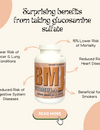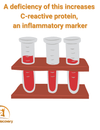No products in the cart.
Beat Blood Sugar in 2 Weeks With 15 Minutes of Exercise!
Posted by: Didrik Sopler
Do you think it’s to good to be true? Amazingly, that is exactly what the reviewed research documented! In this study, 16 young men did 30 second sprints 4-6 times on a stationary bike per session for a total of 6 sessions (Babraj JA, et al. 2009). Insulin sensitivity was...
Read more
Are high glucose levels shrinking your brain?
Posted by: Didrik Sopler
As research pours in, we continue to see more and more evidence of the detrimental effects of high blood glucose levels. This study evaluated glucose levels and it’s association to memory and hippocampal volume, an area of the brain (Kerti L, et al. 2013). The participant were 141 non...
Read more
High blood levels of omega 3 = Low incidence of mini strokes
Posted by: Didrik Sopler
Many studies rely on food questionnaires to calculate omega 3 fatty acid intake, but questionnaires can never be as accurate as a blood test. The reviewed research is especially interesting. Not only were blood levels of omega 3 fatty acid measured: 3660 participants also had MRI scans of their brains at the...
Read more
Memory and the Mediterranean Diet
Posted by: Didrik Sopler
The Mediterranean diet has proven to be beneficial for the prevention of several common chronic diseases. The research reviewed investigated the link between cognition/dementia, and how well the participants followed a Mediterranean diet. (Lourida I, et al. 2013). Information from eleven observational studies and one randomized controlled study were analyzed. Results...
Read more
Enjoy your snacking with no weight gain.
Posted by: Didrik Sopler
Ever wonder what to eat if you get hungry between meals? The reviewed research investigated the response to almonds not only as a snack, but also when eaten with a meal (Tan SY, Mattes RD, 2013). The study went on for 4 weeks. The participants with an increased risk for...
Read more
Depression, inflammation and oxidative stress.
Posted by: Didrik Sopler
Research has indicated that inflammation is one of the reasons for depression. The reviewed study is especially interesting since biomarkers of both inflammation and oxidative stress were measured in the 80 participants diagnosed with depression and also in the control group (Baek D., Park Y., 2013). Levels of omega 3...
Read more
Omega 3 fatty acid and prostate cancer
Posted by: Didrik Sopler
If you have watched the news lately, you have probably heard about a study linking increased risk of prostate cancer with omega 3 fatty acids ( Brasky TM, et al. 2013). The media, looking for big headlines, presented this as a new truth about omega 3 fat. Supposedly, it was...
Read more
Magnesium facts which may surprise you.
Posted by: Didrik Sopler
Did you know that magnesium deficiencies have been shown to increase cardiac arrhythmia’s? Magnesium is one of the most important minerals because magnesium affects many functions, but this reviewed research focused on cardiovascular disease. The research included studies of 313.041 individuals and investigated associations of circulating and dietary magnesium with...
Read more
Important research related to Alzheimer's disease
Posted by: Didrik Sopler
Alzheimer’s disease is at least partially caused by decreased clearance of the beta-amyloid peptide breakdown products. The reviewed research investigated how different diets may affect the removal of these breakdown products (Hanson AJ,et al. 2013). One group of the participants were older adults with normal cognition, while the other group...
Read more
What is the best time day to be physically active?
Posted by: Didrik Sopler
The reviewed research evaluated how walking at different times affected the blood glucose after a meals (Dipietro L,et al. 2013). The participants were 60 years or older inactive individuals with elevated fasting blood glucose levels between 105 and 125 mg/dl. The exercise protocols consisted of either 15 minutes of walking...
Read more
Prevent Alzheimer's disease and keep your brain from shrinking
Posted by: Didrik Sopler
We all dread Alzheimer’s disease and dementia. The reviewed study is interesting because it relates to something we all want to prevent (Douaud G., et al. 2013). Researchers demonstrated that B-vitamin treatment reduced by as much as sevenfold the cerebral atrophy in those gray matter regions most vulnerable to the...
Read more
Specific fat produced from exercise makes you lose weight
Posted by: Didrik Sopler
That fat can make you lose weight may sound strange. Even stranger is what the reviewed research documented (Böstrom P, et.al.,2012). When both mice and humans exercise, a membrane protein is cleaved and secreted as a newly identified hormone called irisin. Irisin acts on what’s called white fat cells, that’s...
Read more
Spend less time exercising, but get big benefits
Posted by: Didrik Sopler
Several studies in the last few years have shown that high intensity short interval training is a very effective way of exercising. This means that if you exercise fairly hard, you don’t have to do it for very long, and you don’t have to do it very often either. The...
Read more
Surprising effects of meditation if practiced a specific way.
Posted by: Didrik Sopler
We can now find more and more research related to the benefits of meditation. A lot of the research is related to the relaxing effects of meditation and it may look like meditation is just another way of getting relaxed. While relaxation can be beneficial in itself, there are more...
Read more
There's more than protein in your chicken!
Posted by: Didrik Sopler
Unless you are buying antibiotic-free or organic chicken, you probably know that you’re buying chicken that has been fed antibiotics. What you may not know however is that arsenic-based drugs are permitted in poultry production. Researchers at John Hopkins investigated for that reason how much arsenic chicken meat contained (Nachman...
Read more
Still don't believe? Omega 3 fatty acids, total mortality and heart disease
Posted by: Didrik Sopler
Have you ever questioned the benefits of omega 3 fat? Even though so much research has been published on the benefits, many people have reservations. This new study did not rely on self-reported dietary intake, which some of the studies have, but instead used blood tests to measure the...
Read more
Save your eyes: reduce the risk of macular degeneration
Posted by: Didrik Sopler, Ph.D., L.Ac.
We all value our eyesight. New research shows us an easy way to help prevent macular degeneration (Merle BM, et al. 2013). 963 participants were followed for 31 months and plasma fatty acids were measured from fasting blood samples, eye examinations were also performed. High plasma omega-3 fatty acids were...
Read more
Your dinner can affect how much you eat the next day
Posted by: Didrik Sopler
Recent research indicates that the gut bacterial flora may affect the metabolism including appetite, and the reviewed study evaluated the effects of a whole grain barley kernel product on markers of metabolism and appetite regulation in healthy people (Johansson EV,et al. 2013).Boiled barley kernels were compared with white wheat bread...
Read more
More Good News About Vitamin D
Posted by: Didrik Sopler
Are you always tired? Try having your vitamin D levels checked, then take vitamin D if you are deficient. The energy of our cells is produced in the mitochondria of our cells. Poor mitochondrial function has been implicated in fatigue. The reviewed research examined the effect of vitamin D in...
Read more

Mental stress associated with coronary artery calcification
Posted by: Didrik Sopler
We have all heard that excessive stress is unhealthy. The research referred to here investigated the association between cortisol response and a marker of sub-clinical coronary atherosclerosis (Hamer M., et al., 2009). Cortisol is a stress hormone. The participants were exposed to mental stress through certain tasks. Coronary artery calcification...
Read more






